Hospitality Operations Management: A Report on Milestone Hotel, London
VerifiedAdded on 2020/11/23
|17
|4637
|183
Report
AI Summary
This report provides an executive summary of Hospitality Operations Management, focusing on the Milestone Hotel in London. It explores the nature of hospitality products and services, analyzing factors like inseparability, intangibility, and perishability. The report examines influences on demand, customer profiles, and average spending power, considering factors like seasonal changes, income levels, and economic situations. It also evaluates the main stages in product and service development, including idea generation, screening, and market research, alongside the features that shape customer perceptions. Furthermore, the report assesses different pricing methods, revenue generation, and profitability factors. Finally, it applies performance measures and appraisal techniques to the operations, product, and overall business, concluding with an analysis of business analysis, evaluation, and planning in the hospitality context.
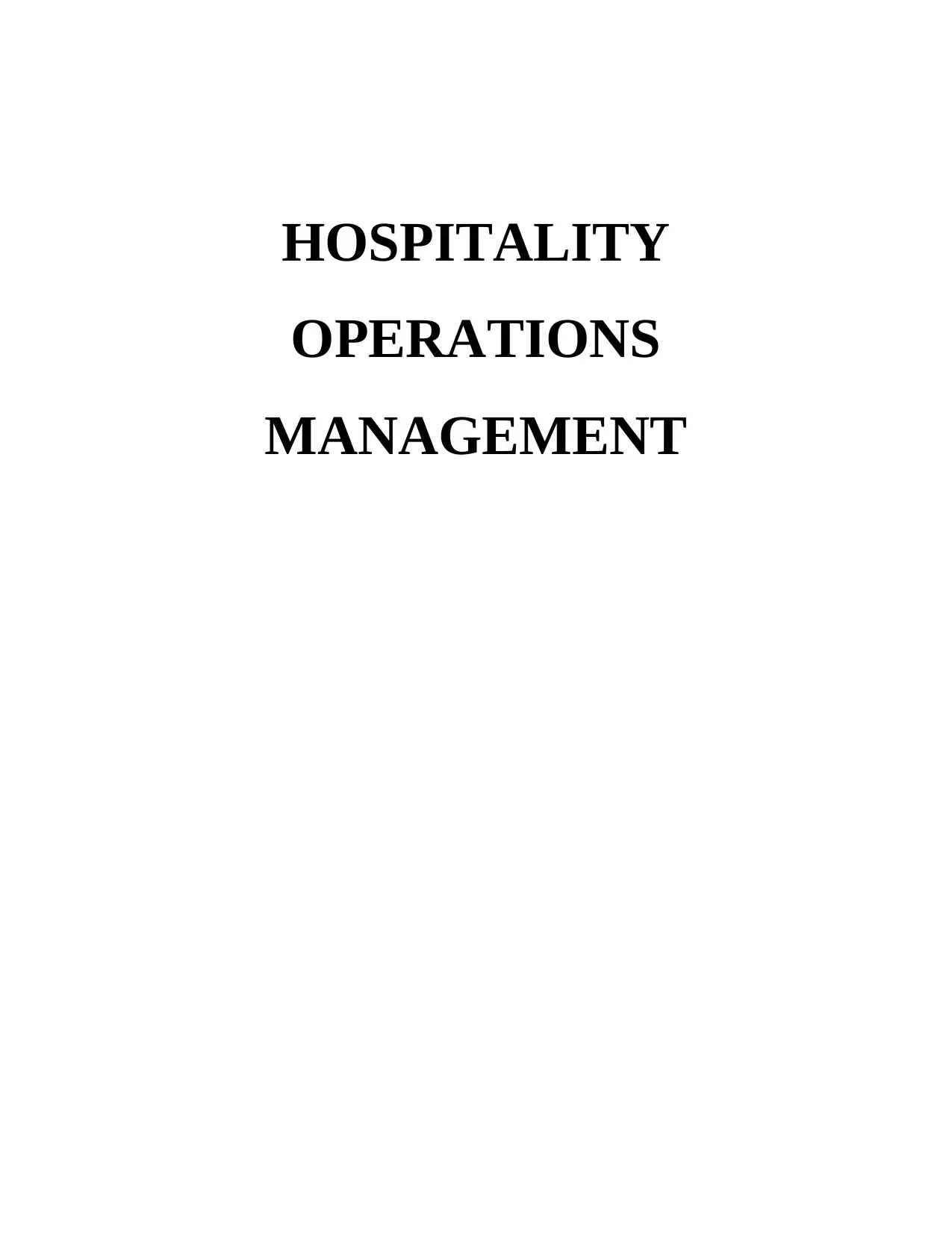
HOSPITALITY
OPERATIONS
MANAGEMENT
OPERATIONS
MANAGEMENT
Paraphrase This Document
Need a fresh take? Get an instant paraphrase of this document with our AI Paraphraser
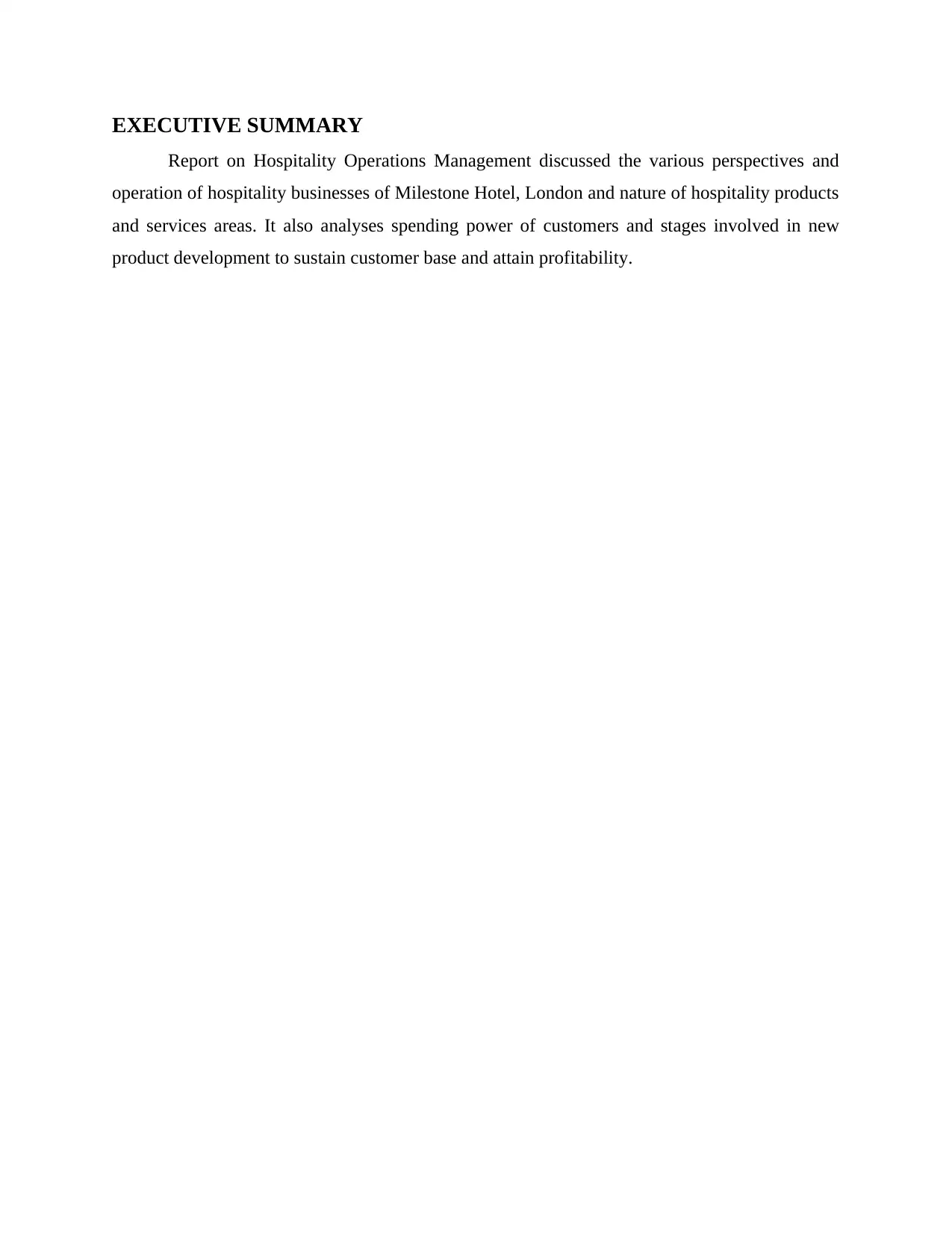
EXECUTIVE SUMMARY
Report on Hospitality Operations Management discussed the various perspectives and
operation of hospitality businesses of Milestone Hotel, London and nature of hospitality products
and services areas. It also analyses spending power of customers and stages involved in new
product development to sustain customer base and attain profitability.
Report on Hospitality Operations Management discussed the various perspectives and
operation of hospitality businesses of Milestone Hotel, London and nature of hospitality products
and services areas. It also analyses spending power of customers and stages involved in new
product development to sustain customer base and attain profitability.
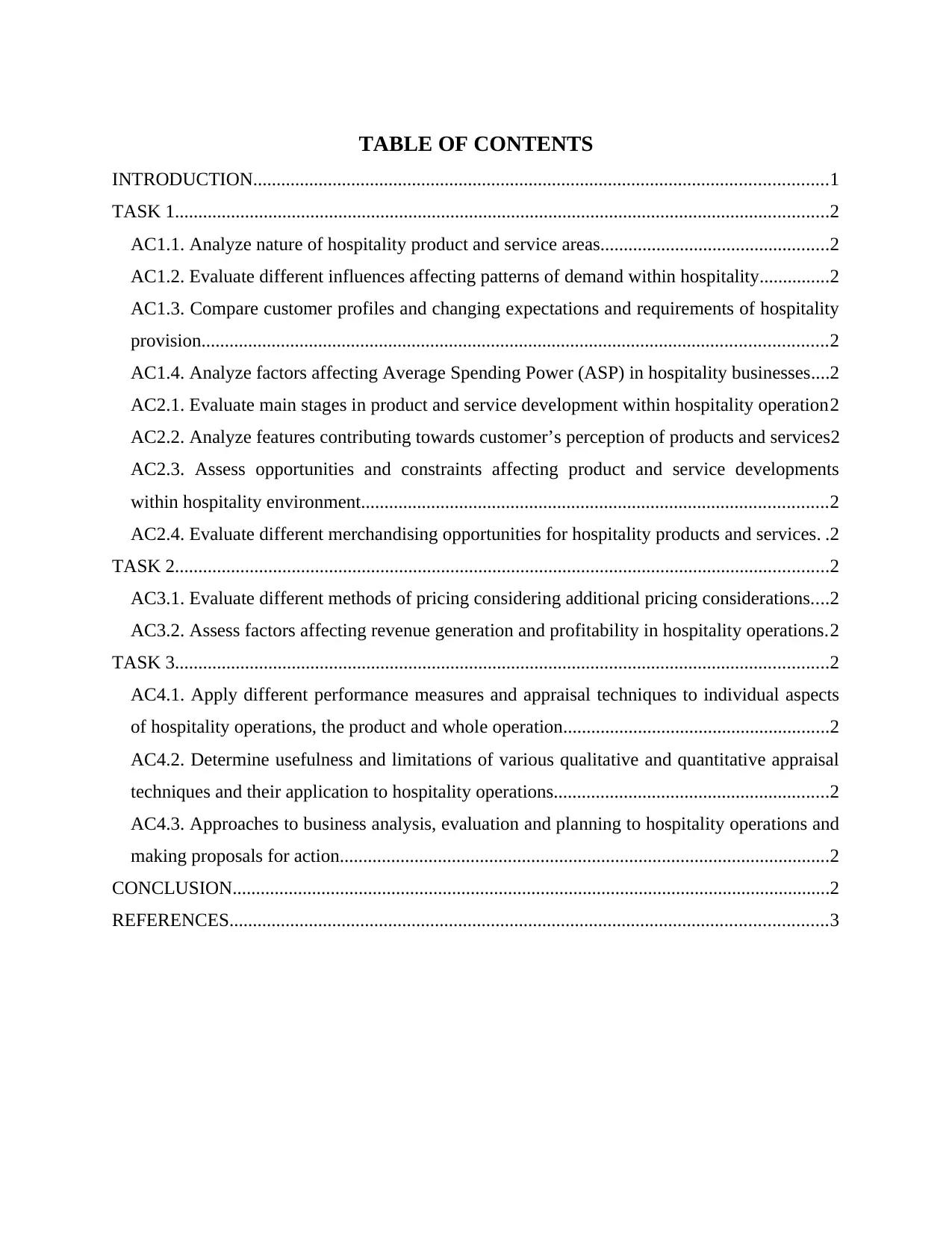
TABLE OF CONTENTS
INTRODUCTION...........................................................................................................................1
TASK 1............................................................................................................................................2
AC1.1. Analyze nature of hospitality product and service areas.................................................2
AC1.2. Evaluate different influences affecting patterns of demand within hospitality...............2
AC1.3. Compare customer profiles and changing expectations and requirements of hospitality
provision......................................................................................................................................2
AC1.4. Analyze factors affecting Average Spending Power (ASP) in hospitality businesses....2
AC2.1. Evaluate main stages in product and service development within hospitality operation2
AC2.2. Analyze features contributing towards customer’s perception of products and services2
AC2.3. Assess opportunities and constraints affecting product and service developments
within hospitality environment....................................................................................................2
AC2.4. Evaluate different merchandising opportunities for hospitality products and services. .2
TASK 2............................................................................................................................................2
AC3.1. Evaluate different methods of pricing considering additional pricing considerations....2
AC3.2. Assess factors affecting revenue generation and profitability in hospitality operations.2
TASK 3............................................................................................................................................2
AC4.1. Apply different performance measures and appraisal techniques to individual aspects
of hospitality operations, the product and whole operation.........................................................2
AC4.2. Determine usefulness and limitations of various qualitative and quantitative appraisal
techniques and their application to hospitality operations...........................................................2
AC4.3. Approaches to business analysis, evaluation and planning to hospitality operations and
making proposals for action.........................................................................................................2
CONCLUSION................................................................................................................................2
REFERENCES................................................................................................................................3
INTRODUCTION...........................................................................................................................1
TASK 1............................................................................................................................................2
AC1.1. Analyze nature of hospitality product and service areas.................................................2
AC1.2. Evaluate different influences affecting patterns of demand within hospitality...............2
AC1.3. Compare customer profiles and changing expectations and requirements of hospitality
provision......................................................................................................................................2
AC1.4. Analyze factors affecting Average Spending Power (ASP) in hospitality businesses....2
AC2.1. Evaluate main stages in product and service development within hospitality operation2
AC2.2. Analyze features contributing towards customer’s perception of products and services2
AC2.3. Assess opportunities and constraints affecting product and service developments
within hospitality environment....................................................................................................2
AC2.4. Evaluate different merchandising opportunities for hospitality products and services. .2
TASK 2............................................................................................................................................2
AC3.1. Evaluate different methods of pricing considering additional pricing considerations....2
AC3.2. Assess factors affecting revenue generation and profitability in hospitality operations.2
TASK 3............................................................................................................................................2
AC4.1. Apply different performance measures and appraisal techniques to individual aspects
of hospitality operations, the product and whole operation.........................................................2
AC4.2. Determine usefulness and limitations of various qualitative and quantitative appraisal
techniques and their application to hospitality operations...........................................................2
AC4.3. Approaches to business analysis, evaluation and planning to hospitality operations and
making proposals for action.........................................................................................................2
CONCLUSION................................................................................................................................2
REFERENCES................................................................................................................................3
⊘ This is a preview!⊘
Do you want full access?
Subscribe today to unlock all pages.

Trusted by 1+ million students worldwide
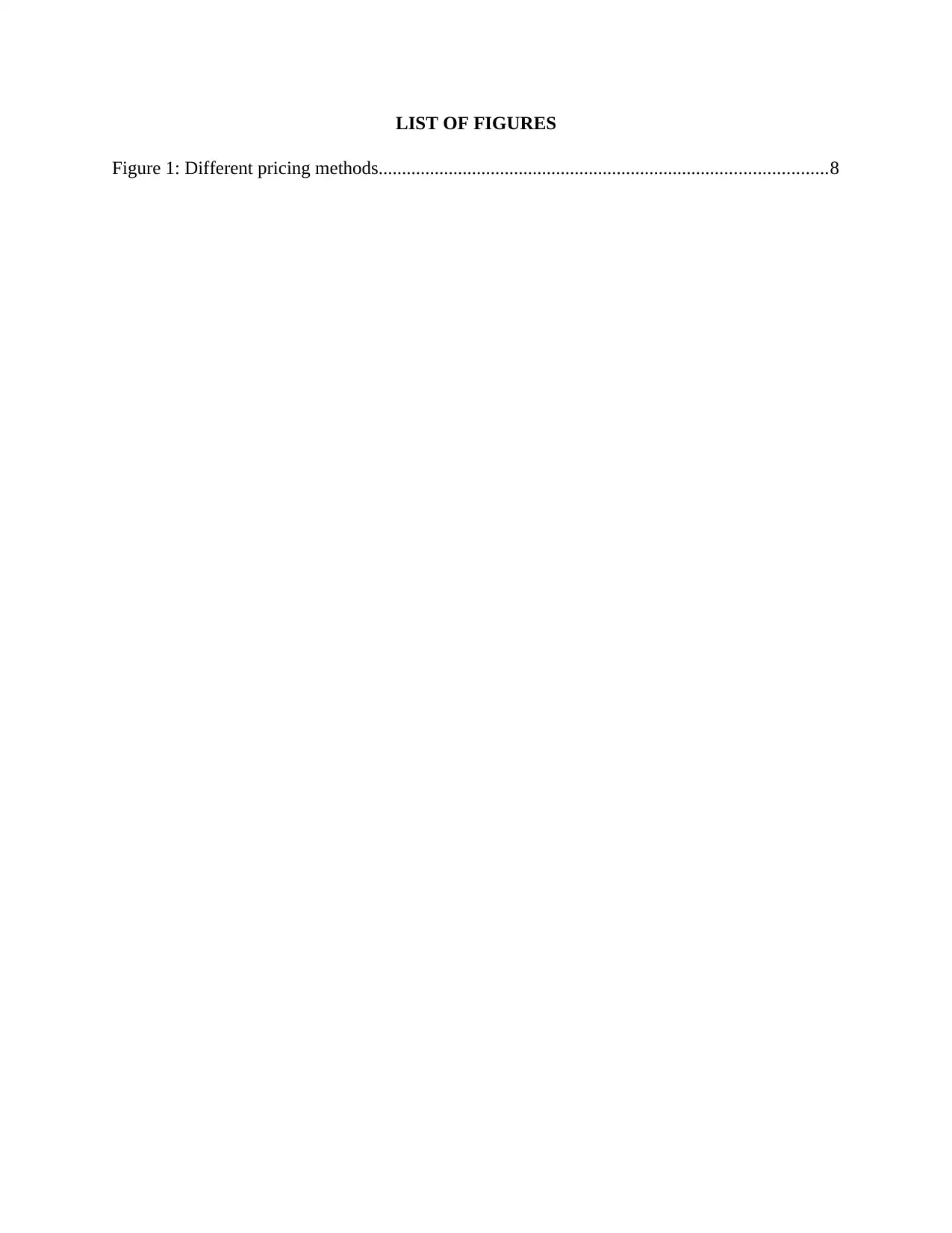
LIST OF FIGURES
Figure 1: Different pricing methods................................................................................................8
Figure 1: Different pricing methods................................................................................................8
Paraphrase This Document
Need a fresh take? Get an instant paraphrase of this document with our AI Paraphraser
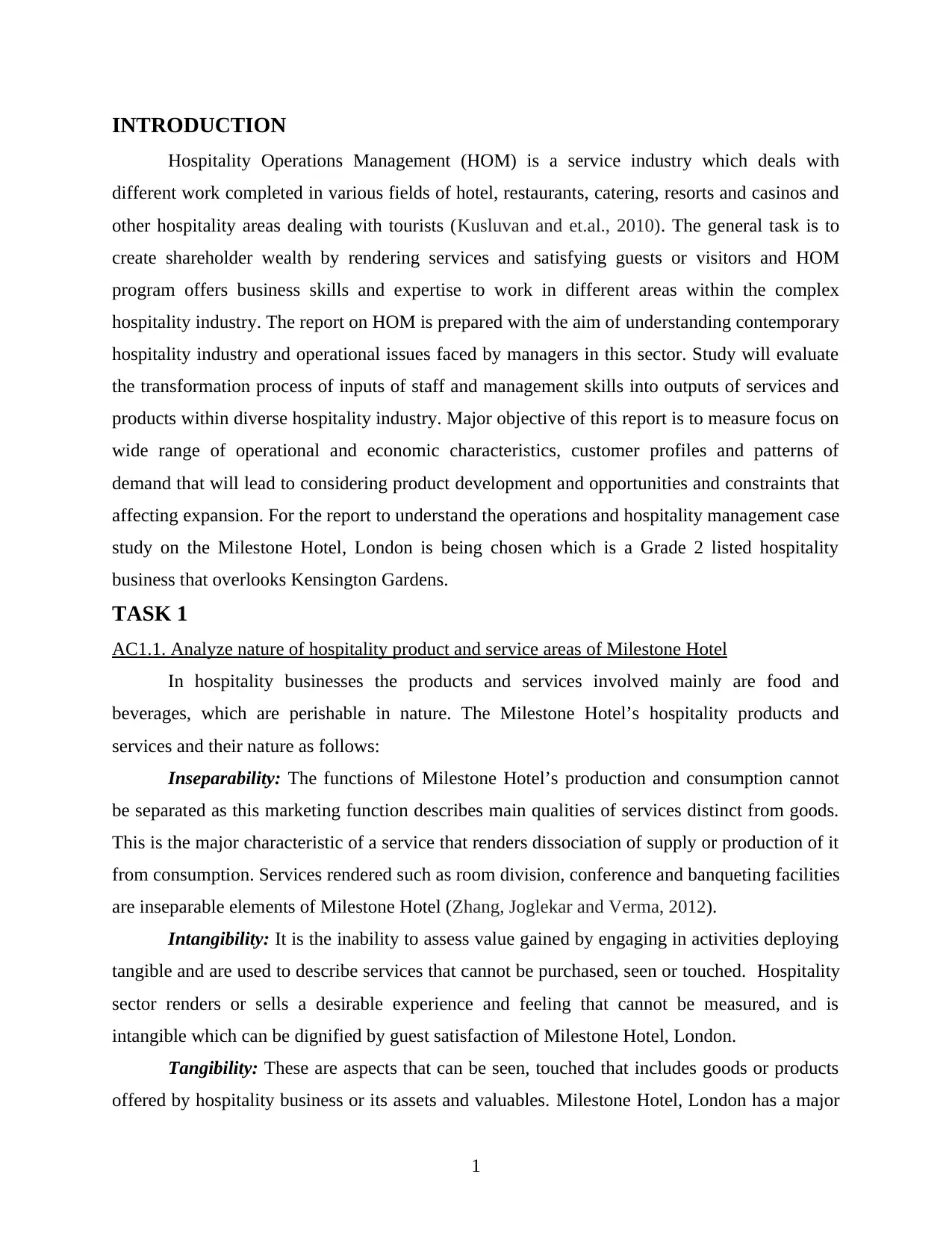
INTRODUCTION
Hospitality Operations Management (HOM) is a service industry which deals with
different work completed in various fields of hotel, restaurants, catering, resorts and casinos and
other hospitality areas dealing with tourists (Kusluvan and et.al., 2010). The general task is to
create shareholder wealth by rendering services and satisfying guests or visitors and HOM
program offers business skills and expertise to work in different areas within the complex
hospitality industry. The report on HOM is prepared with the aim of understanding contemporary
hospitality industry and operational issues faced by managers in this sector. Study will evaluate
the transformation process of inputs of staff and management skills into outputs of services and
products within diverse hospitality industry. Major objective of this report is to measure focus on
wide range of operational and economic characteristics, customer profiles and patterns of
demand that will lead to considering product development and opportunities and constraints that
affecting expansion. For the report to understand the operations and hospitality management case
study on the Milestone Hotel, London is being chosen which is a Grade 2 listed hospitality
business that overlooks Kensington Gardens.
TASK 1
AC1.1. Analyze nature of hospitality product and service areas of Milestone Hotel
In hospitality businesses the products and services involved mainly are food and
beverages, which are perishable in nature. The Milestone Hotel’s hospitality products and
services and their nature as follows:
Inseparability: The functions of Milestone Hotel’s production and consumption cannot
be separated as this marketing function describes main qualities of services distinct from goods.
This is the major characteristic of a service that renders dissociation of supply or production of it
from consumption. Services rendered such as room division, conference and banqueting facilities
are inseparable elements of Milestone Hotel (Zhang, Joglekar and Verma, 2012).
Intangibility: It is the inability to assess value gained by engaging in activities deploying
tangible and are used to describe services that cannot be purchased, seen or touched. Hospitality
sector renders or sells a desirable experience and feeling that cannot be measured, and is
intangible which can be dignified by guest satisfaction of Milestone Hotel, London.
Tangibility: These are aspects that can be seen, touched that includes goods or products
offered by hospitality business or its assets and valuables. Milestone Hotel, London has a major
1
Hospitality Operations Management (HOM) is a service industry which deals with
different work completed in various fields of hotel, restaurants, catering, resorts and casinos and
other hospitality areas dealing with tourists (Kusluvan and et.al., 2010). The general task is to
create shareholder wealth by rendering services and satisfying guests or visitors and HOM
program offers business skills and expertise to work in different areas within the complex
hospitality industry. The report on HOM is prepared with the aim of understanding contemporary
hospitality industry and operational issues faced by managers in this sector. Study will evaluate
the transformation process of inputs of staff and management skills into outputs of services and
products within diverse hospitality industry. Major objective of this report is to measure focus on
wide range of operational and economic characteristics, customer profiles and patterns of
demand that will lead to considering product development and opportunities and constraints that
affecting expansion. For the report to understand the operations and hospitality management case
study on the Milestone Hotel, London is being chosen which is a Grade 2 listed hospitality
business that overlooks Kensington Gardens.
TASK 1
AC1.1. Analyze nature of hospitality product and service areas of Milestone Hotel
In hospitality businesses the products and services involved mainly are food and
beverages, which are perishable in nature. The Milestone Hotel’s hospitality products and
services and their nature as follows:
Inseparability: The functions of Milestone Hotel’s production and consumption cannot
be separated as this marketing function describes main qualities of services distinct from goods.
This is the major characteristic of a service that renders dissociation of supply or production of it
from consumption. Services rendered such as room division, conference and banqueting facilities
are inseparable elements of Milestone Hotel (Zhang, Joglekar and Verma, 2012).
Intangibility: It is the inability to assess value gained by engaging in activities deploying
tangible and are used to describe services that cannot be purchased, seen or touched. Hospitality
sector renders or sells a desirable experience and feeling that cannot be measured, and is
intangible which can be dignified by guest satisfaction of Milestone Hotel, London.
Tangibility: These are aspects that can be seen, touched that includes goods or products
offered by hospitality business or its assets and valuables. Milestone Hotel, London has a major
1
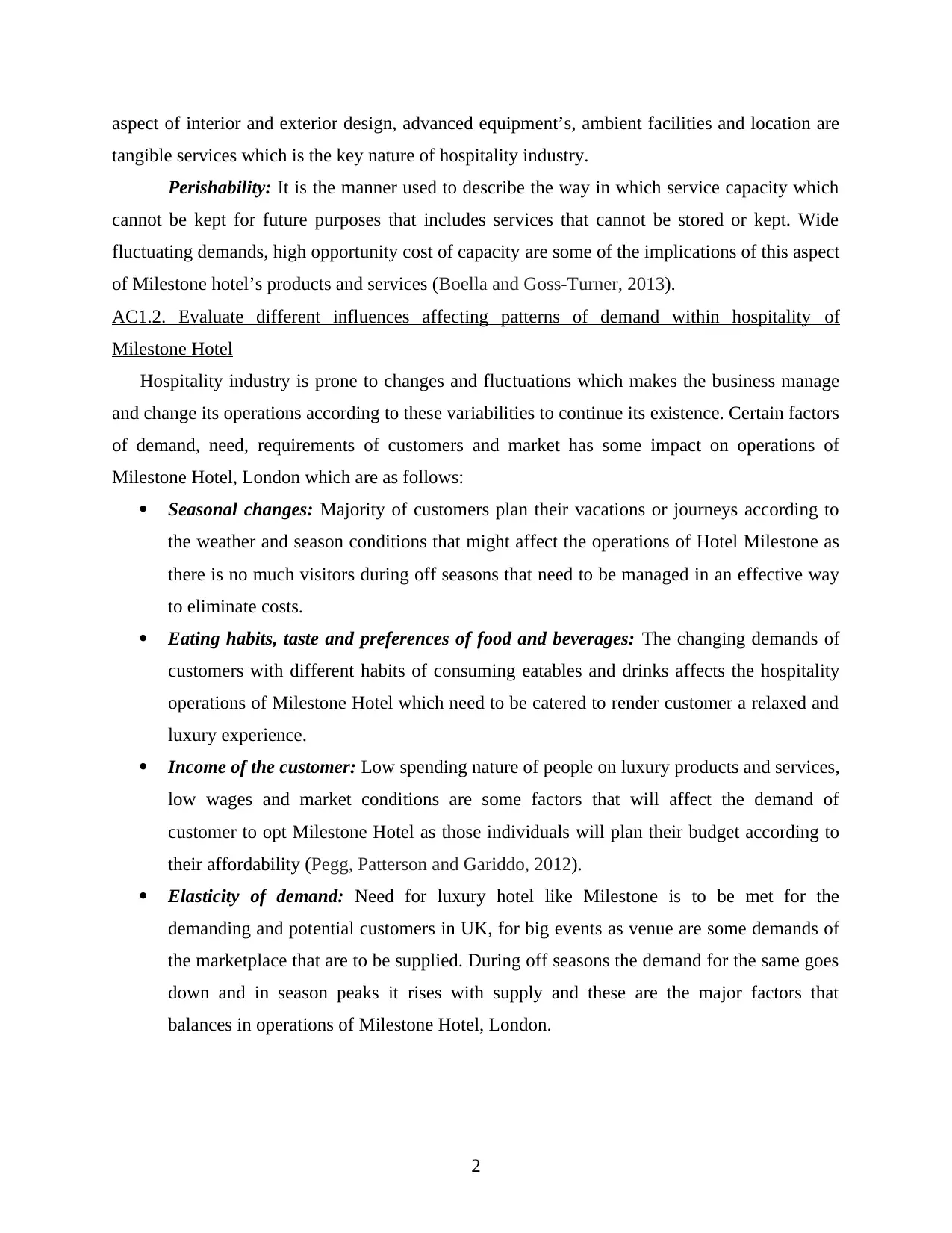
aspect of interior and exterior design, advanced equipment’s, ambient facilities and location are
tangible services which is the key nature of hospitality industry.
Perishability: It is the manner used to describe the way in which service capacity which
cannot be kept for future purposes that includes services that cannot be stored or kept. Wide
fluctuating demands, high opportunity cost of capacity are some of the implications of this aspect
of Milestone hotel’s products and services (Boella and Goss-Turner, 2013).
AC1.2. Evaluate different influences affecting patterns of demand within hospitality of
Milestone Hotel
Hospitality industry is prone to changes and fluctuations which makes the business manage
and change its operations according to these variabilities to continue its existence. Certain factors
of demand, need, requirements of customers and market has some impact on operations of
Milestone Hotel, London which are as follows:
Seasonal changes: Majority of customers plan their vacations or journeys according to
the weather and season conditions that might affect the operations of Hotel Milestone as
there is no much visitors during off seasons that need to be managed in an effective way
to eliminate costs.
Eating habits, taste and preferences of food and beverages: The changing demands of
customers with different habits of consuming eatables and drinks affects the hospitality
operations of Milestone Hotel which need to be catered to render customer a relaxed and
luxury experience.
Income of the customer: Low spending nature of people on luxury products and services,
low wages and market conditions are some factors that will affect the demand of
customer to opt Milestone Hotel as those individuals will plan their budget according to
their affordability (Pegg, Patterson and Gariddo, 2012).
Elasticity of demand: Need for luxury hotel like Milestone is to be met for the
demanding and potential customers in UK, for big events as venue are some demands of
the marketplace that are to be supplied. During off seasons the demand for the same goes
down and in season peaks it rises with supply and these are the major factors that
balances in operations of Milestone Hotel, London.
2
tangible services which is the key nature of hospitality industry.
Perishability: It is the manner used to describe the way in which service capacity which
cannot be kept for future purposes that includes services that cannot be stored or kept. Wide
fluctuating demands, high opportunity cost of capacity are some of the implications of this aspect
of Milestone hotel’s products and services (Boella and Goss-Turner, 2013).
AC1.2. Evaluate different influences affecting patterns of demand within hospitality of
Milestone Hotel
Hospitality industry is prone to changes and fluctuations which makes the business manage
and change its operations according to these variabilities to continue its existence. Certain factors
of demand, need, requirements of customers and market has some impact on operations of
Milestone Hotel, London which are as follows:
Seasonal changes: Majority of customers plan their vacations or journeys according to
the weather and season conditions that might affect the operations of Hotel Milestone as
there is no much visitors during off seasons that need to be managed in an effective way
to eliminate costs.
Eating habits, taste and preferences of food and beverages: The changing demands of
customers with different habits of consuming eatables and drinks affects the hospitality
operations of Milestone Hotel which need to be catered to render customer a relaxed and
luxury experience.
Income of the customer: Low spending nature of people on luxury products and services,
low wages and market conditions are some factors that will affect the demand of
customer to opt Milestone Hotel as those individuals will plan their budget according to
their affordability (Pegg, Patterson and Gariddo, 2012).
Elasticity of demand: Need for luxury hotel like Milestone is to be met for the
demanding and potential customers in UK, for big events as venue are some demands of
the marketplace that are to be supplied. During off seasons the demand for the same goes
down and in season peaks it rises with supply and these are the major factors that
balances in operations of Milestone Hotel, London.
2
⊘ This is a preview!⊘
Do you want full access?
Subscribe today to unlock all pages.

Trusted by 1+ million students worldwide
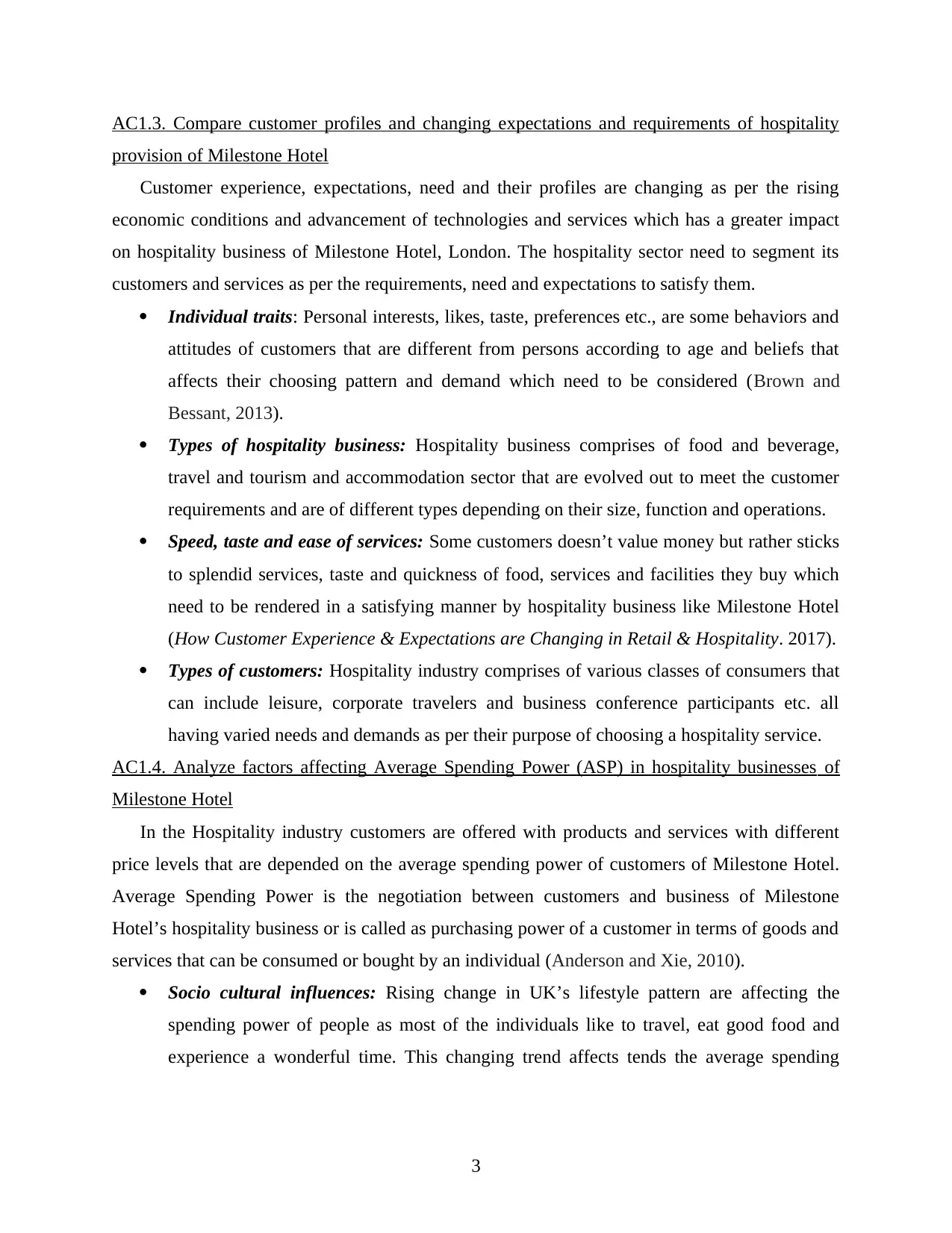
AC1.3. Compare customer profiles and changing expectations and requirements of hospitality
provision of Milestone Hotel
Customer experience, expectations, need and their profiles are changing as per the rising
economic conditions and advancement of technologies and services which has a greater impact
on hospitality business of Milestone Hotel, London. The hospitality sector need to segment its
customers and services as per the requirements, need and expectations to satisfy them.
Individual traits: Personal interests, likes, taste, preferences etc., are some behaviors and
attitudes of customers that are different from persons according to age and beliefs that
affects their choosing pattern and demand which need to be considered (Brown and
Bessant, 2013).
Types of hospitality business: Hospitality business comprises of food and beverage,
travel and tourism and accommodation sector that are evolved out to meet the customer
requirements and are of different types depending on their size, function and operations.
Speed, taste and ease of services: Some customers doesn’t value money but rather sticks
to splendid services, taste and quickness of food, services and facilities they buy which
need to be rendered in a satisfying manner by hospitality business like Milestone Hotel
(How Customer Experience & Expectations are Changing in Retail & Hospitality. 2017).
Types of customers: Hospitality industry comprises of various classes of consumers that
can include leisure, corporate travelers and business conference participants etc. all
having varied needs and demands as per their purpose of choosing a hospitality service.
AC1.4. Analyze factors affecting Average Spending Power (ASP) in hospitality businesses of
Milestone Hotel
In the Hospitality industry customers are offered with products and services with different
price levels that are depended on the average spending power of customers of Milestone Hotel.
Average Spending Power is the negotiation between customers and business of Milestone
Hotel’s hospitality business or is called as purchasing power of a customer in terms of goods and
services that can be consumed or bought by an individual (Anderson and Xie, 2010).
Socio cultural influences: Rising change in UK’s lifestyle pattern are affecting the
spending power of people as most of the individuals like to travel, eat good food and
experience a wonderful time. This changing trend affects tends the average spending
3
provision of Milestone Hotel
Customer experience, expectations, need and their profiles are changing as per the rising
economic conditions and advancement of technologies and services which has a greater impact
on hospitality business of Milestone Hotel, London. The hospitality sector need to segment its
customers and services as per the requirements, need and expectations to satisfy them.
Individual traits: Personal interests, likes, taste, preferences etc., are some behaviors and
attitudes of customers that are different from persons according to age and beliefs that
affects their choosing pattern and demand which need to be considered (Brown and
Bessant, 2013).
Types of hospitality business: Hospitality business comprises of food and beverage,
travel and tourism and accommodation sector that are evolved out to meet the customer
requirements and are of different types depending on their size, function and operations.
Speed, taste and ease of services: Some customers doesn’t value money but rather sticks
to splendid services, taste and quickness of food, services and facilities they buy which
need to be rendered in a satisfying manner by hospitality business like Milestone Hotel
(How Customer Experience & Expectations are Changing in Retail & Hospitality. 2017).
Types of customers: Hospitality industry comprises of various classes of consumers that
can include leisure, corporate travelers and business conference participants etc. all
having varied needs and demands as per their purpose of choosing a hospitality service.
AC1.4. Analyze factors affecting Average Spending Power (ASP) in hospitality businesses of
Milestone Hotel
In the Hospitality industry customers are offered with products and services with different
price levels that are depended on the average spending power of customers of Milestone Hotel.
Average Spending Power is the negotiation between customers and business of Milestone
Hotel’s hospitality business or is called as purchasing power of a customer in terms of goods and
services that can be consumed or bought by an individual (Anderson and Xie, 2010).
Socio cultural influences: Rising change in UK’s lifestyle pattern are affecting the
spending power of people as most of the individuals like to travel, eat good food and
experience a wonderful time. This changing trend affects tends the average spending
3
Paraphrase This Document
Need a fresh take? Get an instant paraphrase of this document with our AI Paraphraser
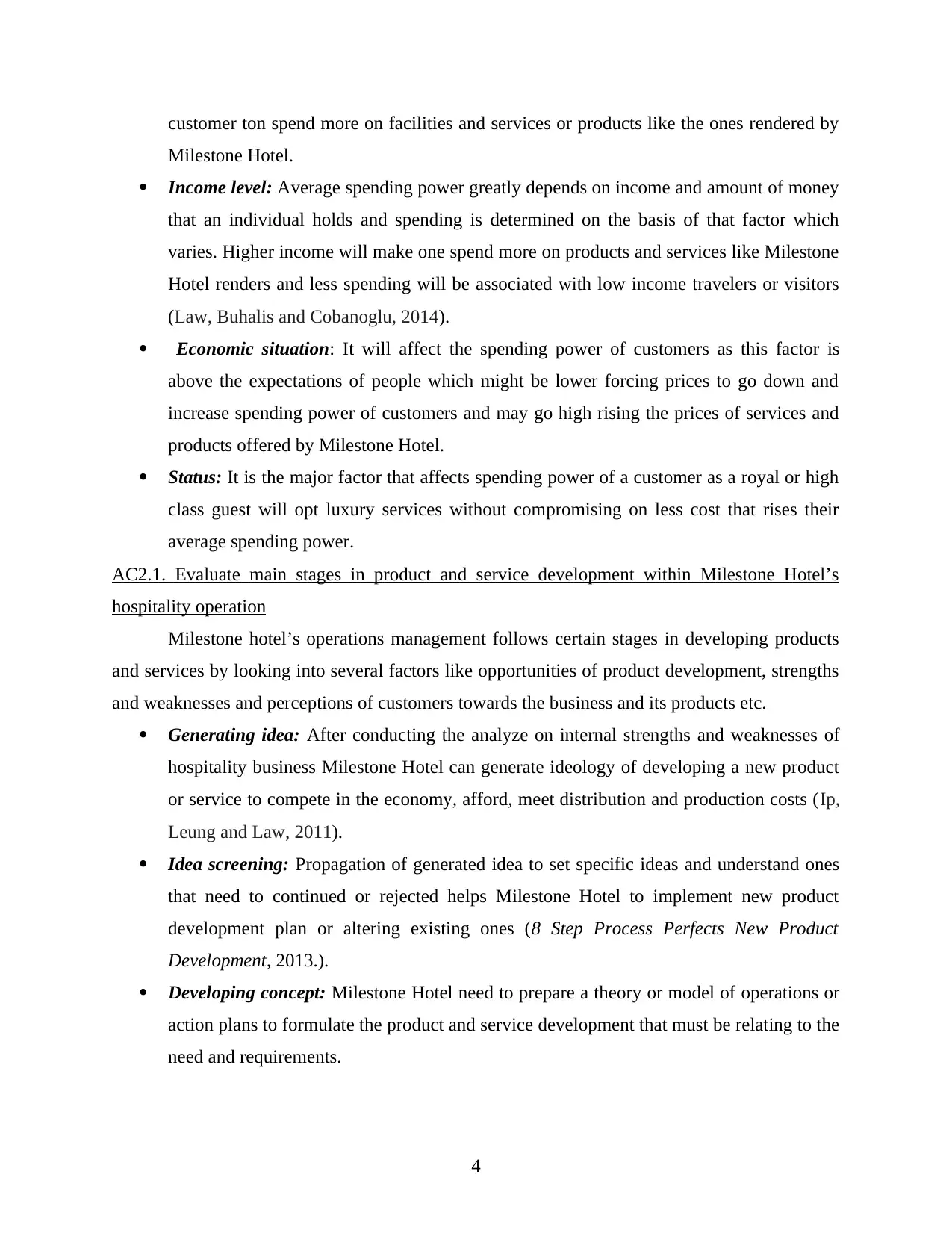
customer ton spend more on facilities and services or products like the ones rendered by
Milestone Hotel.
Income level: Average spending power greatly depends on income and amount of money
that an individual holds and spending is determined on the basis of that factor which
varies. Higher income will make one spend more on products and services like Milestone
Hotel renders and less spending will be associated with low income travelers or visitors
(Law, Buhalis and Cobanoglu, 2014).
Economic situation: It will affect the spending power of customers as this factor is
above the expectations of people which might be lower forcing prices to go down and
increase spending power of customers and may go high rising the prices of services and
products offered by Milestone Hotel.
Status: It is the major factor that affects spending power of a customer as a royal or high
class guest will opt luxury services without compromising on less cost that rises their
average spending power.
AC2.1. Evaluate main stages in product and service development within Milestone Hotel’s
hospitality operation
Milestone hotel’s operations management follows certain stages in developing products
and services by looking into several factors like opportunities of product development, strengths
and weaknesses and perceptions of customers towards the business and its products etc.
Generating idea: After conducting the analyze on internal strengths and weaknesses of
hospitality business Milestone Hotel can generate ideology of developing a new product
or service to compete in the economy, afford, meet distribution and production costs (Ip,
Leung and Law, 2011).
Idea screening: Propagation of generated idea to set specific ideas and understand ones
that need to continued or rejected helps Milestone Hotel to implement new product
development plan or altering existing ones (8 Step Process Perfects New Product
Development, 2013.).
Developing concept: Milestone Hotel need to prepare a theory or model of operations or
action plans to formulate the product and service development that must be relating to the
need and requirements.
4
Milestone Hotel.
Income level: Average spending power greatly depends on income and amount of money
that an individual holds and spending is determined on the basis of that factor which
varies. Higher income will make one spend more on products and services like Milestone
Hotel renders and less spending will be associated with low income travelers or visitors
(Law, Buhalis and Cobanoglu, 2014).
Economic situation: It will affect the spending power of customers as this factor is
above the expectations of people which might be lower forcing prices to go down and
increase spending power of customers and may go high rising the prices of services and
products offered by Milestone Hotel.
Status: It is the major factor that affects spending power of a customer as a royal or high
class guest will opt luxury services without compromising on less cost that rises their
average spending power.
AC2.1. Evaluate main stages in product and service development within Milestone Hotel’s
hospitality operation
Milestone hotel’s operations management follows certain stages in developing products
and services by looking into several factors like opportunities of product development, strengths
and weaknesses and perceptions of customers towards the business and its products etc.
Generating idea: After conducting the analyze on internal strengths and weaknesses of
hospitality business Milestone Hotel can generate ideology of developing a new product
or service to compete in the economy, afford, meet distribution and production costs (Ip,
Leung and Law, 2011).
Idea screening: Propagation of generated idea to set specific ideas and understand ones
that need to continued or rejected helps Milestone Hotel to implement new product
development plan or altering existing ones (8 Step Process Perfects New Product
Development, 2013.).
Developing concept: Milestone Hotel need to prepare a theory or model of operations or
action plans to formulate the product and service development that must be relating to the
need and requirements.
4
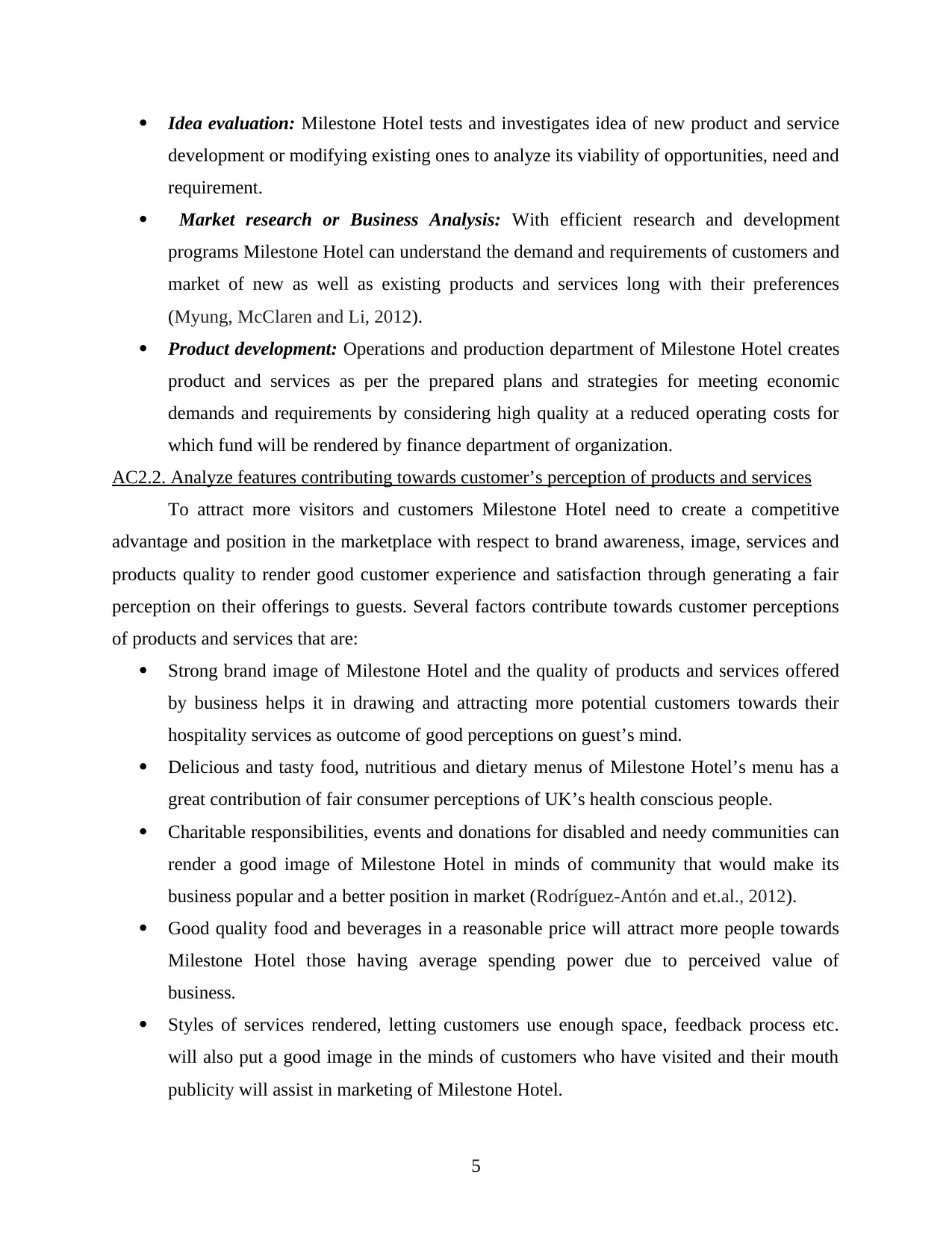
Idea evaluation: Milestone Hotel tests and investigates idea of new product and service
development or modifying existing ones to analyze its viability of opportunities, need and
requirement.
Market research or Business Analysis: With efficient research and development
programs Milestone Hotel can understand the demand and requirements of customers and
market of new as well as existing products and services long with their preferences
(Myung, McClaren and Li, 2012).
Product development: Operations and production department of Milestone Hotel creates
product and services as per the prepared plans and strategies for meeting economic
demands and requirements by considering high quality at a reduced operating costs for
which fund will be rendered by finance department of organization.
AC2.2. Analyze features contributing towards customer’s perception of products and services
To attract more visitors and customers Milestone Hotel need to create a competitive
advantage and position in the marketplace with respect to brand awareness, image, services and
products quality to render good customer experience and satisfaction through generating a fair
perception on their offerings to guests. Several factors contribute towards customer perceptions
of products and services that are:
Strong brand image of Milestone Hotel and the quality of products and services offered
by business helps it in drawing and attracting more potential customers towards their
hospitality services as outcome of good perceptions on guest’s mind.
Delicious and tasty food, nutritious and dietary menus of Milestone Hotel’s menu has a
great contribution of fair consumer perceptions of UK’s health conscious people.
Charitable responsibilities, events and donations for disabled and needy communities can
render a good image of Milestone Hotel in minds of community that would make its
business popular and a better position in market (Rodríguez-Antón and et.al., 2012).
Good quality food and beverages in a reasonable price will attract more people towards
Milestone Hotel those having average spending power due to perceived value of
business.
Styles of services rendered, letting customers use enough space, feedback process etc.
will also put a good image in the minds of customers who have visited and their mouth
publicity will assist in marketing of Milestone Hotel.
5
development or modifying existing ones to analyze its viability of opportunities, need and
requirement.
Market research or Business Analysis: With efficient research and development
programs Milestone Hotel can understand the demand and requirements of customers and
market of new as well as existing products and services long with their preferences
(Myung, McClaren and Li, 2012).
Product development: Operations and production department of Milestone Hotel creates
product and services as per the prepared plans and strategies for meeting economic
demands and requirements by considering high quality at a reduced operating costs for
which fund will be rendered by finance department of organization.
AC2.2. Analyze features contributing towards customer’s perception of products and services
To attract more visitors and customers Milestone Hotel need to create a competitive
advantage and position in the marketplace with respect to brand awareness, image, services and
products quality to render good customer experience and satisfaction through generating a fair
perception on their offerings to guests. Several factors contribute towards customer perceptions
of products and services that are:
Strong brand image of Milestone Hotel and the quality of products and services offered
by business helps it in drawing and attracting more potential customers towards their
hospitality services as outcome of good perceptions on guest’s mind.
Delicious and tasty food, nutritious and dietary menus of Milestone Hotel’s menu has a
great contribution of fair consumer perceptions of UK’s health conscious people.
Charitable responsibilities, events and donations for disabled and needy communities can
render a good image of Milestone Hotel in minds of community that would make its
business popular and a better position in market (Rodríguez-Antón and et.al., 2012).
Good quality food and beverages in a reasonable price will attract more people towards
Milestone Hotel those having average spending power due to perceived value of
business.
Styles of services rendered, letting customers use enough space, feedback process etc.
will also put a good image in the minds of customers who have visited and their mouth
publicity will assist in marketing of Milestone Hotel.
5
⊘ This is a preview!⊘
Do you want full access?
Subscribe today to unlock all pages.

Trusted by 1+ million students worldwide
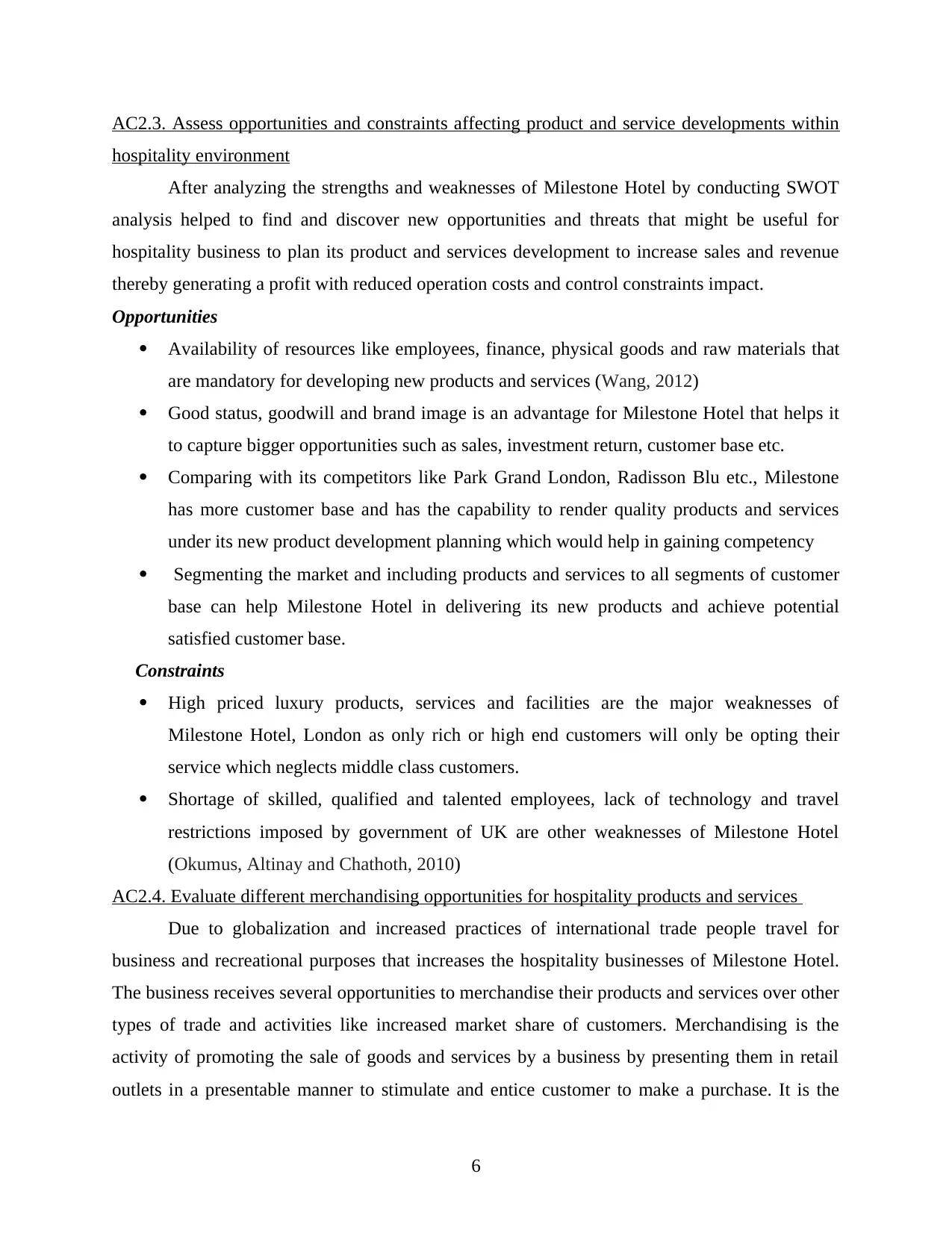
AC2.3. Assess opportunities and constraints affecting product and service developments within
hospitality environment
After analyzing the strengths and weaknesses of Milestone Hotel by conducting SWOT
analysis helped to find and discover new opportunities and threats that might be useful for
hospitality business to plan its product and services development to increase sales and revenue
thereby generating a profit with reduced operation costs and control constraints impact.
Opportunities
Availability of resources like employees, finance, physical goods and raw materials that
are mandatory for developing new products and services (Wang, 2012)
Good status, goodwill and brand image is an advantage for Milestone Hotel that helps it
to capture bigger opportunities such as sales, investment return, customer base etc.
Comparing with its competitors like Park Grand London, Radisson Blu etc., Milestone
has more customer base and has the capability to render quality products and services
under its new product development planning which would help in gaining competency
Segmenting the market and including products and services to all segments of customer
base can help Milestone Hotel in delivering its new products and achieve potential
satisfied customer base.
Constraints
High priced luxury products, services and facilities are the major weaknesses of
Milestone Hotel, London as only rich or high end customers will only be opting their
service which neglects middle class customers.
Shortage of skilled, qualified and talented employees, lack of technology and travel
restrictions imposed by government of UK are other weaknesses of Milestone Hotel
(Okumus, Altinay and Chathoth, 2010)
AC2.4. Evaluate different merchandising opportunities for hospitality products and services
Due to globalization and increased practices of international trade people travel for
business and recreational purposes that increases the hospitality businesses of Milestone Hotel.
The business receives several opportunities to merchandise their products and services over other
types of trade and activities like increased market share of customers. Merchandising is the
activity of promoting the sale of goods and services by a business by presenting them in retail
outlets in a presentable manner to stimulate and entice customer to make a purchase. It is the
6
hospitality environment
After analyzing the strengths and weaknesses of Milestone Hotel by conducting SWOT
analysis helped to find and discover new opportunities and threats that might be useful for
hospitality business to plan its product and services development to increase sales and revenue
thereby generating a profit with reduced operation costs and control constraints impact.
Opportunities
Availability of resources like employees, finance, physical goods and raw materials that
are mandatory for developing new products and services (Wang, 2012)
Good status, goodwill and brand image is an advantage for Milestone Hotel that helps it
to capture bigger opportunities such as sales, investment return, customer base etc.
Comparing with its competitors like Park Grand London, Radisson Blu etc., Milestone
has more customer base and has the capability to render quality products and services
under its new product development planning which would help in gaining competency
Segmenting the market and including products and services to all segments of customer
base can help Milestone Hotel in delivering its new products and achieve potential
satisfied customer base.
Constraints
High priced luxury products, services and facilities are the major weaknesses of
Milestone Hotel, London as only rich or high end customers will only be opting their
service which neglects middle class customers.
Shortage of skilled, qualified and talented employees, lack of technology and travel
restrictions imposed by government of UK are other weaknesses of Milestone Hotel
(Okumus, Altinay and Chathoth, 2010)
AC2.4. Evaluate different merchandising opportunities for hospitality products and services
Due to globalization and increased practices of international trade people travel for
business and recreational purposes that increases the hospitality businesses of Milestone Hotel.
The business receives several opportunities to merchandise their products and services over other
types of trade and activities like increased market share of customers. Merchandising is the
activity of promoting the sale of goods and services by a business by presenting them in retail
outlets in a presentable manner to stimulate and entice customer to make a purchase. It is the
6
Paraphrase This Document
Need a fresh take? Get an instant paraphrase of this document with our AI Paraphraser
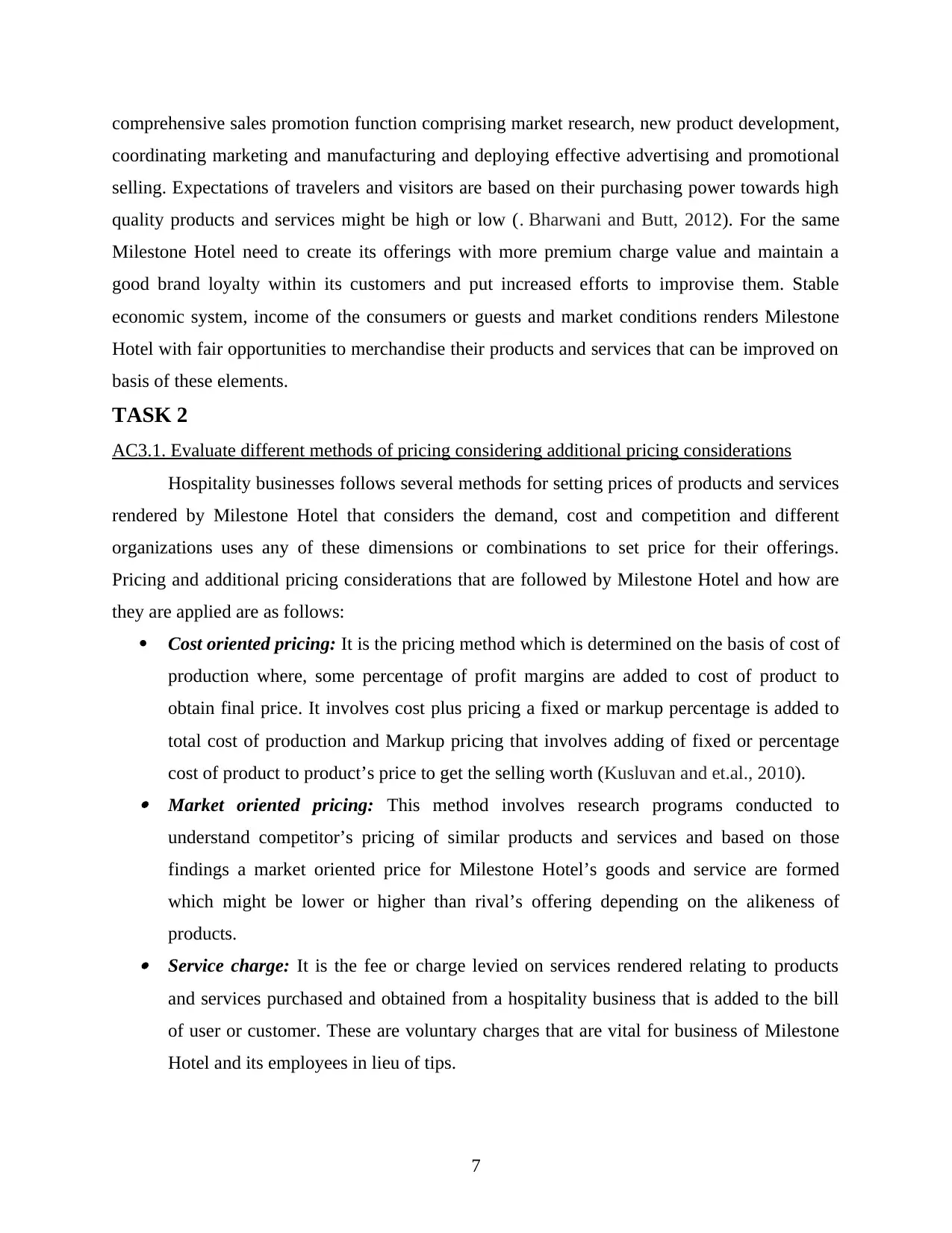
comprehensive sales promotion function comprising market research, new product development,
coordinating marketing and manufacturing and deploying effective advertising and promotional
selling. Expectations of travelers and visitors are based on their purchasing power towards high
quality products and services might be high or low (. Bharwani and Butt, 2012). For the same
Milestone Hotel need to create its offerings with more premium charge value and maintain a
good brand loyalty within its customers and put increased efforts to improvise them. Stable
economic system, income of the consumers or guests and market conditions renders Milestone
Hotel with fair opportunities to merchandise their products and services that can be improved on
basis of these elements.
TASK 2
AC3.1. Evaluate different methods of pricing considering additional pricing considerations
Hospitality businesses follows several methods for setting prices of products and services
rendered by Milestone Hotel that considers the demand, cost and competition and different
organizations uses any of these dimensions or combinations to set price for their offerings.
Pricing and additional pricing considerations that are followed by Milestone Hotel and how are
they are applied are as follows:
Cost oriented pricing: It is the pricing method which is determined on the basis of cost of
production where, some percentage of profit margins are added to cost of product to
obtain final price. It involves cost plus pricing a fixed or markup percentage is added to
total cost of production and Markup pricing that involves adding of fixed or percentage
cost of product to product’s price to get the selling worth (Kusluvan and et.al., 2010). Market oriented pricing: This method involves research programs conducted to
understand competitor’s pricing of similar products and services and based on those
findings a market oriented price for Milestone Hotel’s goods and service are formed
which might be lower or higher than rival’s offering depending on the alikeness of
products. Service charge: It is the fee or charge levied on services rendered relating to products
and services purchased and obtained from a hospitality business that is added to the bill
of user or customer. These are voluntary charges that are vital for business of Milestone
Hotel and its employees in lieu of tips.
7
coordinating marketing and manufacturing and deploying effective advertising and promotional
selling. Expectations of travelers and visitors are based on their purchasing power towards high
quality products and services might be high or low (. Bharwani and Butt, 2012). For the same
Milestone Hotel need to create its offerings with more premium charge value and maintain a
good brand loyalty within its customers and put increased efforts to improvise them. Stable
economic system, income of the consumers or guests and market conditions renders Milestone
Hotel with fair opportunities to merchandise their products and services that can be improved on
basis of these elements.
TASK 2
AC3.1. Evaluate different methods of pricing considering additional pricing considerations
Hospitality businesses follows several methods for setting prices of products and services
rendered by Milestone Hotel that considers the demand, cost and competition and different
organizations uses any of these dimensions or combinations to set price for their offerings.
Pricing and additional pricing considerations that are followed by Milestone Hotel and how are
they are applied are as follows:
Cost oriented pricing: It is the pricing method which is determined on the basis of cost of
production where, some percentage of profit margins are added to cost of product to
obtain final price. It involves cost plus pricing a fixed or markup percentage is added to
total cost of production and Markup pricing that involves adding of fixed or percentage
cost of product to product’s price to get the selling worth (Kusluvan and et.al., 2010). Market oriented pricing: This method involves research programs conducted to
understand competitor’s pricing of similar products and services and based on those
findings a market oriented price for Milestone Hotel’s goods and service are formed
which might be lower or higher than rival’s offering depending on the alikeness of
products. Service charge: It is the fee or charge levied on services rendered relating to products
and services purchased and obtained from a hospitality business that is added to the bill
of user or customer. These are voluntary charges that are vital for business of Milestone
Hotel and its employees in lieu of tips.
7
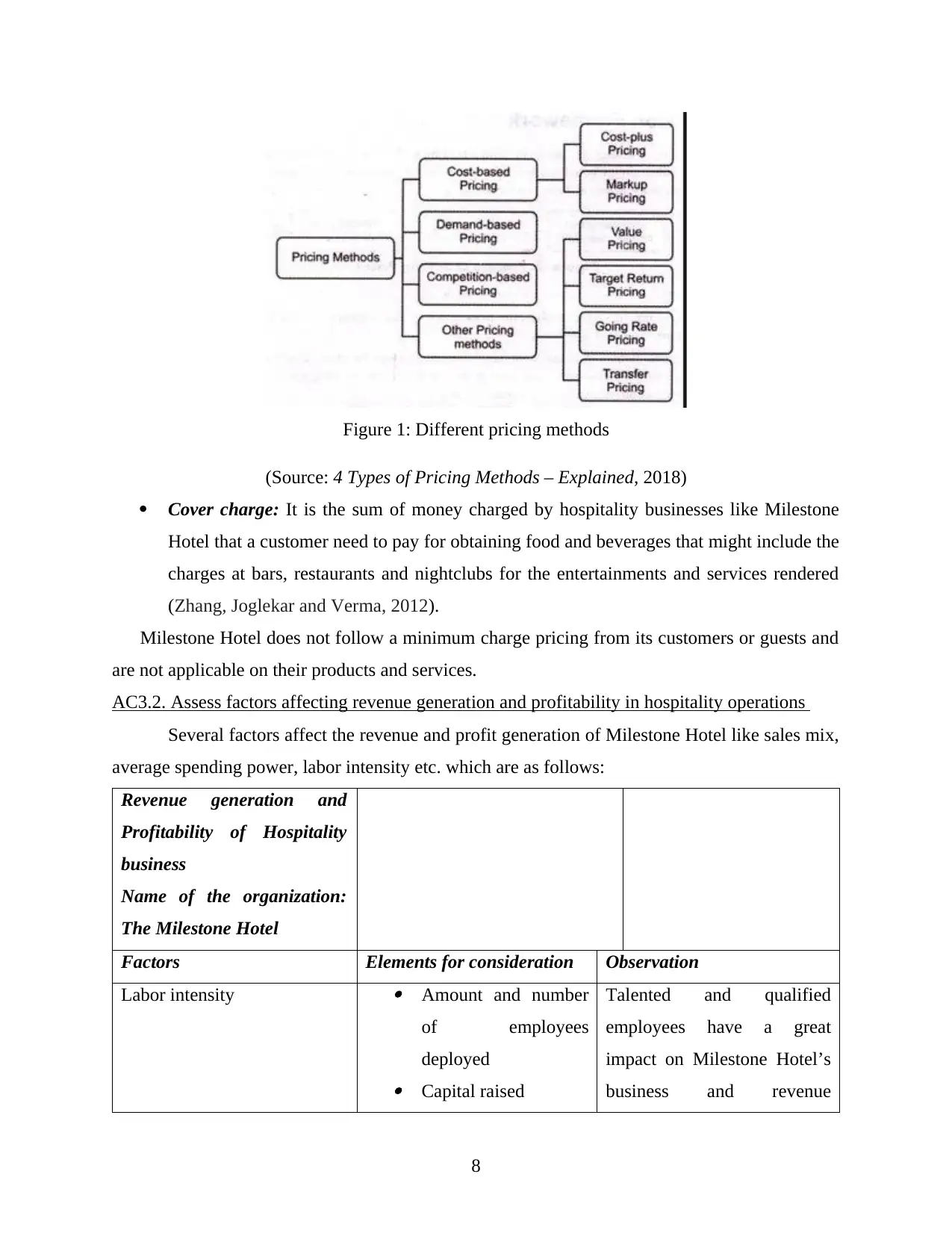
Figure 1: Different pricing methods
(Source: 4 Types of Pricing Methods – Explained, 2018)
Cover charge: It is the sum of money charged by hospitality businesses like Milestone
Hotel that a customer need to pay for obtaining food and beverages that might include the
charges at bars, restaurants and nightclubs for the entertainments and services rendered
(Zhang, Joglekar and Verma, 2012).
Milestone Hotel does not follow a minimum charge pricing from its customers or guests and
are not applicable on their products and services.
AC3.2. Assess factors affecting revenue generation and profitability in hospitality operations
Several factors affect the revenue and profit generation of Milestone Hotel like sales mix,
average spending power, labor intensity etc. which are as follows:
Revenue generation and
Profitability of Hospitality
business
Name of the organization:
The Milestone Hotel
Factors Elements for consideration Observation
Labor intensity
Amount and number
of employees
deployed
Capital raised
Talented and qualified
employees have a great
impact on Milestone Hotel’s
business and revenue
8
(Source: 4 Types of Pricing Methods – Explained, 2018)
Cover charge: It is the sum of money charged by hospitality businesses like Milestone
Hotel that a customer need to pay for obtaining food and beverages that might include the
charges at bars, restaurants and nightclubs for the entertainments and services rendered
(Zhang, Joglekar and Verma, 2012).
Milestone Hotel does not follow a minimum charge pricing from its customers or guests and
are not applicable on their products and services.
AC3.2. Assess factors affecting revenue generation and profitability in hospitality operations
Several factors affect the revenue and profit generation of Milestone Hotel like sales mix,
average spending power, labor intensity etc. which are as follows:
Revenue generation and
Profitability of Hospitality
business
Name of the organization:
The Milestone Hotel
Factors Elements for consideration Observation
Labor intensity
Amount and number
of employees
deployed
Capital raised
Talented and qualified
employees have a great
impact on Milestone Hotel’s
business and revenue
8
⊘ This is a preview!⊘
Do you want full access?
Subscribe today to unlock all pages.

Trusted by 1+ million students worldwide
1 out of 17
Related Documents
Your All-in-One AI-Powered Toolkit for Academic Success.
+13062052269
info@desklib.com
Available 24*7 on WhatsApp / Email
![[object Object]](/_next/static/media/star-bottom.7253800d.svg)
Unlock your academic potential
Copyright © 2020–2025 A2Z Services. All Rights Reserved. Developed and managed by ZUCOL.





